Merit Badges
Merit badges are a cornerstone of the Scouting USA program, symbolizing personal growth, skill development, and achievement. Each badge represents mastery of a specific skill or knowledge area, ranging from outdoor survival and first aid to robotics and citizenship. By pursuing merit badges, Scouts are encouraged to explore diverse interests, fostering curiosity and a lifelong love of learning.
Personal Growth: Merit badges encourage scouts to explore diverse interests, fostering curiosity and a passion for lifelong learning. The process builds confidence, teaching responsibility and perseverance as scouts work toward their goals with guidance from experienced mentors.
Skill Development: Each badge represents mastery of a unique skill, from outdoor survival and first aid to robotics and public speaking. Scouts gain practical knowledge and problem-solving abilities, preparing them for real-world challenges and introducing potential career paths.
Achievement: Earning merit badges symbolizes dedication and hard work, serving as tangible milestones in a scout’s journey. Accumulating badges is essential for rank advancement, such as achieving the prestigious Eagle Scout rank, reinforcing the values of discipline, leadership, and a commitment to the Scout Oath and Law.
Steps for Earning a Merit Badge
Troop 1 has a straightforward process for earning merit badges, following these basic steps:
The Scout develops an interest in a merit badge and may begin working on the requirements.
The Scout informs the Advancement Chair Stephanie Adams (sa1966@hotmail.com) that he or she is starting to work on the merit badge, and opens a record in the Advancement section on the Scoutbook app.
The Scout finds the contact information for the appropriate Merit Badge Councilor here, and contacts the councellor, ccing Ms Stephanie. (Remember, according to Scouting USA safety rules there must be a third person (another adult or Scout Buddy) present in any Scout/Adult communications.)
The counselor considers any work toward requirements completed prior to the initial discussion with the unit leader.
The Scout, his buddy and the counselor meet (often several times).
The Scout finishes the requirements, and the counselor approves their completion, informing Ms. Stephanie and signing off in the Scoutbook app.
Where to Start?
Not long ago I asked a group of Scouts, “Why are you in Scouting?” Almost all of them answered some variation of “because of all the useful things I’m learning that I can use throughout my life”. Most of that learning happens while earning merit badges. But with over 135 to choose from, where do you start?
Maybe the best place is with the merit badges required to earn the Eagle Scout rank. Of the 21 that are required for a Scout to earn, 14 of them come from a list of “prerequisites,” with the other 7 being “electives.” These 14 are considered to be the core skills and knowledge that Scouting wants to impart to every member. Although you can earn them in any order, there is a certain consensus among experts as to which are appropriate for younger Scouts, vs which might be more relevant to an older Scout. We’ve structured the guide below with that rough order or hierarchy in mind. Note that for a few of the requirements, you have a choice on which badge to earn (i.e., Hiking vs Swimming vs Cycling). We’ve also provided links to articles and videos to help you prepare for each merit badge.
Eagle Required Merit Badges
-
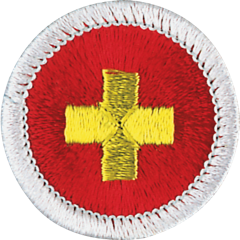
First Aid
A good choice for your first merit badge. Its a prerequisite for others, and just generally comes in handy.
-

Camping
This may take over 6 months to earn as it requires 15 nights of camping with the troop to complete.
-

Cooking
Will teach you to cook both at home and in the wild, as well as the basics of nutrition and hygene.
-

Personal Fitness
Scouts assess fitness, set goals, follow a 12-week exercise plan, and learn nutrition and wellness habits.
Personal Fitness Official Page
-

Swimming
Scouts learn swimming skills, water rescue, safety, and endurance to become confident and capable swimmers.
-
OR
-

Hiking
Scouts improve endurance, navigate trails, and learn safety while completing multiple hikes, including a 20-miler.
-
OR
-
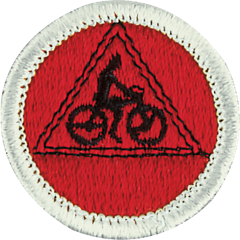
Cycling
Learn biking safety, maintenance, and endurance while completing road or mountain bike rides, including a 50-mile journey.
-
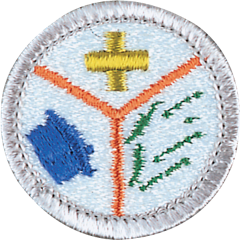
Emergency Preparedness
Scouts develop disaster response plans, prepare a family disaster kit, and learn to assist in emergencies and disasters.
Emergency Preparedness Official Page
-
Or
-

Lifesaving
Prepare Scouts to assist those involved in water accidents, teaching them the basic knowledge of rescue techniques, the skills to perform them, and the judgment to know when and how to act .
-

Environmental Science
Scouts study ecology, perform environmental experiments, and understand human impact on nature while learning conservation methods.
Encironmental Science Official Page
-
Or
-

Sustainability
Scouts learn about sustainable practices in energy, water, food, and waste management to help protect the environment for future generations.
-

Citizenship in the Community
Scouts learn about local government, community service, and responsibilities of good citizenship through volunteer work and civic engagement.
-

Citizenship in Society
Scouts explore diversity and ethical decision-making while learning how to be respectful, active members of society.
Citizenship in Society Official Page
-
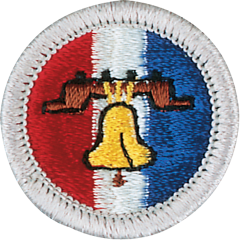
Citizenship in the Nation
Scouts study U.S. history, government , and citizenship responsibilities while visiting national landmarks and engaging in civic discussions.
Citizenship in the Nation Official Page
-
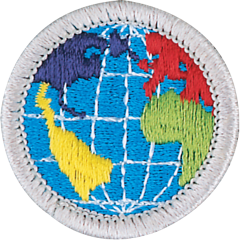
Citizenship in the World
Study diplomacy and world affairs to become informed citizens., and how nations work together through institutions to solve world issues.
-

Personal Management
Learn budgeting, saving, and financial planning to develop smart money management skills for the future
Personal Management Official Page
-

Communications
Scouts develop public speaking, writing, and interpersonal communication skills through speeches, interviews, and presentations.
-
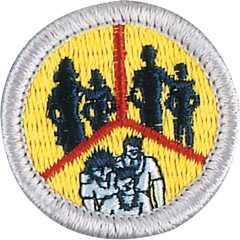
Family Life
Scouts discuss values in family meetings and practice responsibility by assisting with family tasks and planning a household project.

